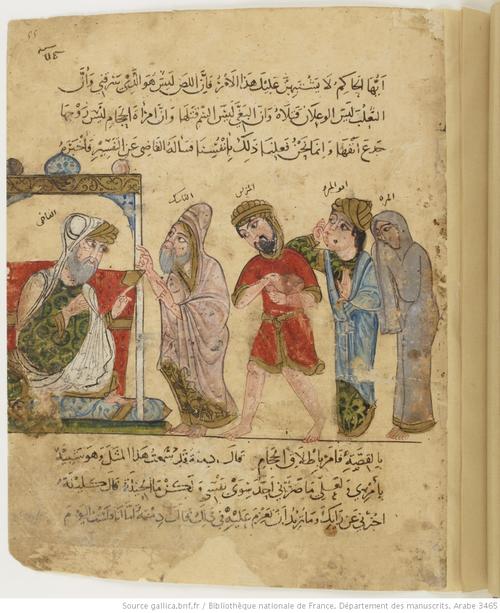Cultural Translation
Kalīla wa Dimna , traduit par Ibn al-MuqaffaʿʿAbd Allâh (0720?-0756?)
Image Credit: Bibliothèque nationale de France, MSarabe 3465, fol. 55r.
PD Dr. Isabel Toral
When Kalila wa-Dimna was read, copied, translated and rewritten in more than 40 languages, the structure and content underwent significant transformations, since it had to be transferred into very diverse linguistic, cultural and religious contexts. To approach these complexities adequately, AnonymClassic views translation as an active process of acculturation and adaptation, i.e. as cultural translation.
Though much was omitted for being untranslatable, notably specific cultural and epistemological terms, the subsequent versions were also enriched by new interpretations aimed at matching terms and ideas from the original context to those of the translator’s. The investigation of these interventions will allow exploring the ways in which foreign concepts and issues were adapted to those in the translator’s own culture, but which could also be misunderstood and creatively reinterpreted. This applies to figures, religious concepts, value systems, images, and epistemology, but also to the diverse “Weltwissen” (common sense knowledge) in every cultural setting.
For instance, the figure of the Brahmin advisor to the king becomes a “philosopher” in Middle Persian, hence indicating the impact of Hellenism in Sasanian times. The Indian Brahmin, a frequent character in the tales, turns into a Muslim ascetic (nāsik), and then a Christian hermit. The Arabic translator introduces reward in the afterlife, and the Latin translator the concept of expiating sin. Not surprisingly in a work of advice, many culture-specific terms center on epistemology, and the text as a whole shifts from belonging to the genre of imparting knowledge (in Sanskrit nitisastra) to teaching applied culture (adab) and wisdom (ḥikma) in Arabic and universal wisdom (sapientia nationum mundi) in Latin.
The investigation of Kalila wa-Dimnas’ s textual tradition from the perspective of cultural translation promises to contribute to better understand the complexities of cross-cultural transfer, the transmission of concepts and the circulation of ideas and objects of knowledge.
